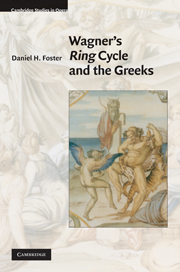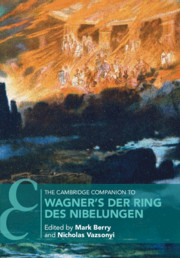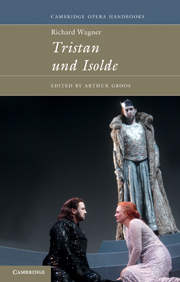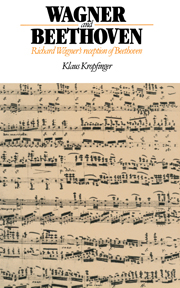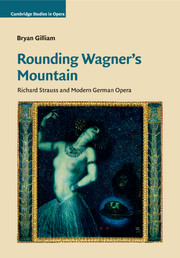Wagner's Ring Cycle and the Greeks
Part of Cambridge Studies in Opera
- Author: Daniel H. Foster, Duke University, North Carolina
- Date Published: February 2010
- availability: Available
- format: Hardback
- isbn: 9780521517393
Hardback
Other available formats:
eBook
Looking for an inspection copy?
Please email [email protected] to enquire about an inspection copy of this book
-
Through his reading of primary and secondary classical sources, as well as his theoretical writings, Richard Wagner developed a Hegelian-inspired theory linking the evolution of classical Greek politics and poetry. This book demonstrates how, by turning theory into practice, Wagner used this evolutionary paradigm to shape the music and the libretto of the Ring cycle. Foster describes how each of the Ring's operas represents a particular phase of Greek poetic and political development: Das Rheingold and Die Walküre create epic national identity in its earlier and later stages respectively; Siegfried expresses lyric personal identity; and Götterdämmerung destructively culminates with a tragi-comedy about civic identity. This study sees the Greeks through the lens of those scholars whose work influenced Wagner most, focusing on epic, lyric, and comedy, as well as Greek tragedy. Most significantly, the book interrogates the ways in which Wagner uses Greek aesthetics to further his own ideological goals.
Read more- Includes extensive and well-documented lists of all classical primary and secondary sources that it can be proved Wagner knew
- Each section begins with a thorough analysis of three of the most important poetic genres in the West: epic, lyric, and drama
- Addresses in detail Wagner's theoretical works, which are infamously difficult and confusing
Reviews & endorsements
'A highly recommended addition to any Wagnerite's library' Classical Music
See more reviews'This is a book full of stimulus for classicists, historians and musicologists alike.' Teresa Morgan, The Times Literary Supplement
Customer reviews
Not yet reviewed
Be the first to review
Review was not posted due to profanity
×Product details
- Date Published: February 2010
- format: Hardback
- isbn: 9780521517393
- length: 398 pages
- dimensions: 235 x 160 x 24 mm
- weight: 0.77kg
- contains: 14 music examples
- availability: Available
Table of Contents
Preface
Introduction
Part I. Epic:
1. Introduction: what is epic?
2. Retrospective narrative and the epic process
3. The orchestral narrator and elementary epic
4. Spiritual and factual realities in epic
Part II. Lyric:
5. Introduction: what is lyric?
6. Orpheus and lyric liberation
7. First-person opera and lyric identity
8. Lyric and the rebirth of tragedy
Part III. Drama:
9. Introduction: what is drama?
10. Opera and tragedy
11. Opera and comedy
12. Resolution and ambiguity in comedy and tragedy
Epilogue: Time, the Ring, and performance studies
Appendices: Wagner's primary and secondary sources: Introduction
Appendix A. Wagner's primary sources
Appendix B. secondary scholarship by authors Wagner knew personally
Appendix C. Secondary scholarship by authors Wagner knew by reputation or by reading
Bibliography.
Sorry, this resource is locked
Please register or sign in to request access. If you are having problems accessing these resources please email [email protected]
Register Sign in» Proceed
You are now leaving the Cambridge University Press website. Your eBook purchase and download will be completed by our partner www.ebooks.com. Please see the permission section of the www.ebooks.com catalogue page for details of the print & copy limits on our eBooks.
Continue ×Are you sure you want to delete your account?
This cannot be undone.
Thank you for your feedback which will help us improve our service.
If you requested a response, we will make sure to get back to you shortly.
×
